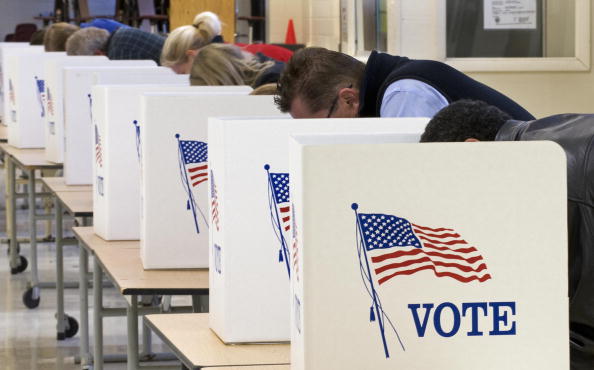These 10 blue states are trying to bypass the Electoral College


A free daily email with the biggest news stories of the day – and the best features from TheWeek.com
You are now subscribed
Your newsletter sign-up was successful
President Trump, as he is fond of reminding us, won the Electoral College with 306 votes to Hillary Clinton's 232, but Clinton amassed about 2.8 million more popular votes at the national scale. Eager to avoid a repeat of that mismatch in elections to come, 10 blue states plus Washington, D.C., have made a compact that would eventually see them allotting their electoral votes to the national popular vote winner, functionally bypassing the Electoral College without passing a constitutional amendment.
The most recent state to sign on is Connecticut, where the governor said Saturday he supports a bill to join the compact, which was passed by the state legislature in late April. The agreement doesn't kick in until states with Electoral College votes totaling 270 — the minimum needed for victory — have joined. With the addition of Connecticut, the involved states' electoral vote total comes to 172.
While a majority of Americans want to move to a popular vote system to choose the president, support for keeping the Electoral College has actually increased in recent years. In 1987, 33 percent wanted to maintain the current system and 61 percent wanted to switch; by 2016, that had shifted to 41 and 54 percent, respectively. Democrats overwhelmingly want to switch, but 3 in 4 Republicans are happy the way things are.
The Week
Escape your echo chamber. Get the facts behind the news, plus analysis from multiple perspectives.

Sign up for The Week's Free Newsletters
From our morning news briefing to a weekly Good News Newsletter, get the best of The Week delivered directly to your inbox.
From our morning news briefing to a weekly Good News Newsletter, get the best of The Week delivered directly to your inbox.
The bypass compact would likely face legal challenge were it to reach the 270-vote trigger. The Constitution does not say electors have to follow their state's popular vote, but most states have some penalty in place for those who don't.
Read The Week's Edward Morrissey and Paul Waldman for dueling accounts of the Electoral College's value — or lack thereof.
A free daily email with the biggest news stories of the day – and the best features from TheWeek.com
Bonnie Kristian was a deputy editor and acting editor-in-chief of TheWeek.com. She is a columnist at Christianity Today and author of Untrustworthy: The Knowledge Crisis Breaking Our Brains, Polluting Our Politics, and Corrupting Christian Community (forthcoming 2022) and A Flexible Faith: Rethinking What It Means to Follow Jesus Today (2018). Her writing has also appeared at Time Magazine, CNN, USA Today, Newsweek, the Los Angeles Times, and The American Conservative, among other outlets.
-
 Properties of the week: pretty thatched cottages
Properties of the week: pretty thatched cottagesThe Week Recommends Featuring homes in West Sussex, Dorset and Suffolk
-
 The week’s best photos
The week’s best photosIn Pictures An explosive meal, a carnival of joy, and more
-
 The ‘ravenous’ demand for Cornish minerals
The ‘ravenous’ demand for Cornish mineralsUnder the Radar Growing need for critical minerals to power tech has intensified ‘appetite’ for lithium, which could be a ‘huge boon’ for local economy
-
 Nobody seems surprised Wagner's Prigozhin died under suspicious circumstances
Nobody seems surprised Wagner's Prigozhin died under suspicious circumstancesSpeed Read
-
 Western mountain climbers allegedly left Pakistani porter to die on K2
Western mountain climbers allegedly left Pakistani porter to die on K2Speed Read
-
 'Circular saw blades' divide controversial Rio Grande buoys installed by Texas governor
'Circular saw blades' divide controversial Rio Grande buoys installed by Texas governorSpeed Read
-
 Los Angeles city workers stage 1-day walkout over labor conditions
Los Angeles city workers stage 1-day walkout over labor conditionsSpeed Read
-
 Mega Millions jackpot climbs to an estimated $1.55 billion
Mega Millions jackpot climbs to an estimated $1.55 billionSpeed Read
-
 Bangladesh dealing with worst dengue fever outbreak on record
Bangladesh dealing with worst dengue fever outbreak on recordSpeed Read
-
 Glacial outburst flooding in Juneau destroys homes
Glacial outburst flooding in Juneau destroys homesSpeed Read
-
 Scotland seeking 'monster hunters' to search for fabled Loch Ness creature
Scotland seeking 'monster hunters' to search for fabled Loch Ness creatureSpeed Read
